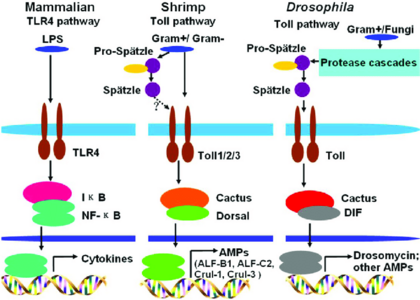| Spätzle (gene) | |||||||
|---|---|---|---|---|---|---|---|
| Identifiers | |||||||
| Organism | |||||||
| Symbol | spz | ||||||
| UniProt | P48607 | ||||||
| |||||||
| Spätzle | |||||||||
|---|---|---|---|---|---|---|---|---|---|
| Identifiers | |||||||||
| Symbol | Spaetzle | ||||||||
| Pfam | PF16077 | ||||||||
| InterPro | IPR032104 | ||||||||
| |||||||||

Spätzle or spaetzle ( German for a type of noodle) is an evolutionarily-conserved arthropod protein first identified in Drosophila melanogaster. [1] It plays a role in embryonic development and in the insect innate immune response. The name was coined by the Nobel laureate Christiane Nüsslein-Volhard after the Spätzle noodle-like form of homozygous mutant fly larvae. [2]
Spätzle has a cystine knot structure supported by disulfide bridges, is glycosylated, and naturally forms a homodimer. Multiple forms are produced by alternative splicing. [3] It is produced as a preprotein, and needs to be activated by a serine protease called spätzle-processing enzyme. The signal sequence spz[1-25] is first cleaved, followed by the spz[26-220] fragment, leaving the final spz[221-326] (Spaetzle C-106) part as the mature protein. [4]
Homodimeric spz binds to a dimeric toll receptor in fruit flies and related organisms, thus activating the signaling cascade. [5]
A ligand of the toll pathway, spz is involved in the formation of the dorso-ventral axis in embryonic development. [6]
- ^ Stein D, Nüsslein-Volhard C (February 1992). "Multiple extracellular activities in Drosophila egg perivitelline fluid are required for establishment of embryonic dorsal-ventral polarity". Cell. 68 (3): 429–40. doi: 10.1016/0092-8674(92)90181-b. PMID 1739964. S2CID 20617175.
- ^ "Christiane Nüsslein-Volhard in Biologie | Schülerlexikon | Lernhelfer". www.lernhelfer.de (in German). Retrieved 2019-11-19.
- ^ DeLotto Y, Smith C, DeLotto R (January 2001). "Multiple isoforms of the Drosophila Spätzle protein are encoded by alternatively spliced maternal mRNAs in the precellular blastoderm embryo". Molecular & General Genetics. 264 (5): 643–52. doi: 10.1007/s004380000350. PMID 11212919. S2CID 1456450.
- ^ P48607
- ^ Morisato D, Anderson KV (February 1994). "The spätzle gene encodes a component of the extracellular signaling pathway establishing the dorsal-ventral pattern of the Drosophila embryo". Cell. 76 (4): 677–88. doi: 10.1016/0092-8674(94)90507-x. PMID 8124709. S2CID 26328826.
- ^ Morisato, Donald (15 June 2001). "Spätzle regulates the shape of the Dorsal gradient in the Drosophila embryo". Development. 128 (12): 2309–2319. doi: 10.1242/dev.128.12.2309. PMID 11493550. Retrieved 10 February 2023.
| Spätzle (gene) | |||||||
|---|---|---|---|---|---|---|---|
| Identifiers | |||||||
| Organism | |||||||
| Symbol | spz | ||||||
| UniProt | P48607 | ||||||
| |||||||
| Spätzle | |||||||||
|---|---|---|---|---|---|---|---|---|---|
| Identifiers | |||||||||
| Symbol | Spaetzle | ||||||||
| Pfam | PF16077 | ||||||||
| InterPro | IPR032104 | ||||||||
| |||||||||

Spätzle or spaetzle ( German for a type of noodle) is an evolutionarily-conserved arthropod protein first identified in Drosophila melanogaster. [1] It plays a role in embryonic development and in the insect innate immune response. The name was coined by the Nobel laureate Christiane Nüsslein-Volhard after the Spätzle noodle-like form of homozygous mutant fly larvae. [2]
Spätzle has a cystine knot structure supported by disulfide bridges, is glycosylated, and naturally forms a homodimer. Multiple forms are produced by alternative splicing. [3] It is produced as a preprotein, and needs to be activated by a serine protease called spätzle-processing enzyme. The signal sequence spz[1-25] is first cleaved, followed by the spz[26-220] fragment, leaving the final spz[221-326] (Spaetzle C-106) part as the mature protein. [4]
Homodimeric spz binds to a dimeric toll receptor in fruit flies and related organisms, thus activating the signaling cascade. [5]
A ligand of the toll pathway, spz is involved in the formation of the dorso-ventral axis in embryonic development. [6]
- ^ Stein D, Nüsslein-Volhard C (February 1992). "Multiple extracellular activities in Drosophila egg perivitelline fluid are required for establishment of embryonic dorsal-ventral polarity". Cell. 68 (3): 429–40. doi: 10.1016/0092-8674(92)90181-b. PMID 1739964. S2CID 20617175.
- ^ "Christiane Nüsslein-Volhard in Biologie | Schülerlexikon | Lernhelfer". www.lernhelfer.de (in German). Retrieved 2019-11-19.
- ^ DeLotto Y, Smith C, DeLotto R (January 2001). "Multiple isoforms of the Drosophila Spätzle protein are encoded by alternatively spliced maternal mRNAs in the precellular blastoderm embryo". Molecular & General Genetics. 264 (5): 643–52. doi: 10.1007/s004380000350. PMID 11212919. S2CID 1456450.
- ^ P48607
- ^ Morisato D, Anderson KV (February 1994). "The spätzle gene encodes a component of the extracellular signaling pathway establishing the dorsal-ventral pattern of the Drosophila embryo". Cell. 76 (4): 677–88. doi: 10.1016/0092-8674(94)90507-x. PMID 8124709. S2CID 26328826.
- ^ Morisato, Donald (15 June 2001). "Spätzle regulates the shape of the Dorsal gradient in the Drosophila embryo". Development. 128 (12): 2309–2319. doi: 10.1242/dev.128.12.2309. PMID 11493550. Retrieved 10 February 2023.